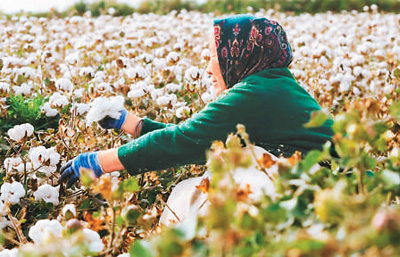
Photo shows a still from the film "Fabrics of Life." (Photo provided by the producer)
In the vast expanse of the Xinjiang Uygur Autonomous Region, there are "white clouds" that are not just beautiful but also a source of livelihood for local farmers. These are cotton bolls. Recently, a documentary film titled "Fabrics of Life" was released in theaters nationwide, revealing the touching stories behind Xinjiang's cotton.
Cotton is an economic crop, and that's the common perception. People usually care about the variety planted, the acreage, the yield, and the price. However, for cotton farmers, it's not just a means of making a living; it's their entire life. Behind each cotton boll are the joys and sorrows of a family.
The film goes beyond documenting the agricultural cycle of cotton, showing its planting, harvesting, and selling. Instead, it shines a light on the people, the cotton farmers, and their lives. This shift in perspective offers viewers a richer and more three-dimensional experience. The emotions that permeate the film have a quiet yet profound strength.
This strength comes from a resilient spirit. The film follows two families, one Uygur and one Han, both embodying the same truth: hard work creates a good life. The world-famous Xinjiang long staple cotton requires manual harvesting in the past. So, every harvest season, the two families face the same challenge: a shortage of labor.
The Arkens put their whole family to work, and neighbors come to help. When the wife falls ill from anxiety, she rests for a day but returns to the cotton fields while still sick, eager to finish the harvest. Zhao Qiang runs around hiring workers, and his parents and wife join in. They don't complain; they just want to get the job done and make money. When Zhao injures his finger, he quickly gets it bandaged and gets back to work, not wanting to waste any time. Both families are simple cotton farmers with no extra thoughts. What shines through is the resilience of ordinary working people. They believe that through their labor, they can provide a good life for their families.
This strength also comes from family harmony. When the film was shot, Arken's youngest daughter, Barna, had just been admitted to university and was preparing to leave home. The day before she left for school, the family held a farewell for her with kebabs and pilaf. But the feast couldn't dispel the sadness of parting. The mother's tears reflect the universal worry of parents when their children leave home. Beyond the sorrow, Barna's young nephew's expressions of love for his family also move the audience, showing the pure emotions between family members.
Zhao's wife, Guan Xiaoyan, is a hard-working woman. She helps her husband with cotton farming and takes care of the elderly and children at home. There's a scene in the film where Guan is tutoring her child while preparing a meal. It's such an ordinary moment, yet it warms the hearts of viewers. Perhaps that's the kind of everyday life people yearn for.
This strength also stems from cultural inheritance. One of the main characters, Arken, is Uygur. At the beginning of the film, Arken takes his whole family to a Uygur wedding. The singing, dancing, delicious food, and overflowing joy give viewers a taste of the unique cultural charm of the Uygur people. There's also the traditional Uygur bread called naan. Arken's wife often makes it, from kneading the dough to baking it in a traditional naan pit. The freshly baked naan tickles people's taste buds. Xinjiang's food culture leaves a deep impression on viewers through this subtle storytelling.
And there's the music. The Uygur people, known for their love of singing and dancing, sing at weddings, gatherings, and even while harvesting cotton. Even if you don't understand Uygur, you can still feel the beauty and goodness in the melodious tunes and songs. This is the power of culture.
Watching the film is never boring. You just quietly feel the emotions flowing from the daily work and lives of the two families. You realize that cotton is more than just an economic crop or a way to make a living. It carries people's hopes for a good life and symbolizes their contentment in their work and daily lives.
To truly understand Xinjiang's cotton, we need to delve deeper than just the cotton itself. It's about the journey of cultivation and the dreams it embodies. It's about the everyday lives of the farmers and the full spectrum of human emotions intertwined with it. "Fabrics of Life" is not just about livelihood; it's about connection and aspiration.
(Source: People's Daily; Reporter: Zhang Yiqi)









